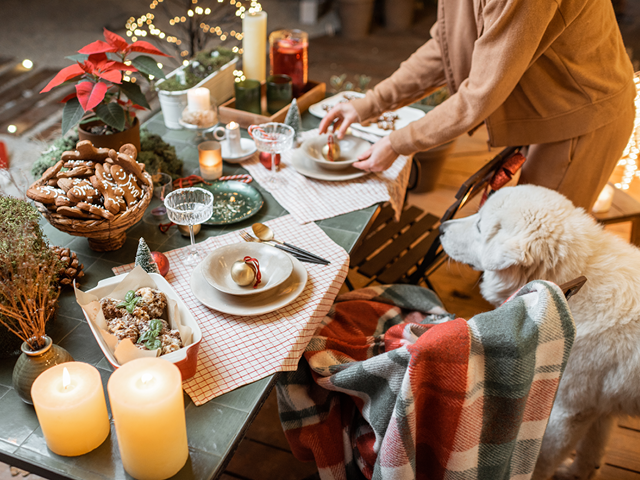What shouldn’t my pet eat?
December 10, 2021

At Christmas we all like a treat. However tempting it can be to share treats with our pets, foods which are safe for us can be extremely harmful to them. We’ve put together a list of our top 5 festive foods that should not be fed to pets.
Can cats and dogs eat chocolate?
This is a NO any time of the year. There is a chemical in chocolate called theobromine. This can be extremely dangerous for our pets. It can trigger vomiting, diarrhoea, hyperactivity, tremors, seizures, and problems with the heart that can be fatal. The darker the chocolate the more severe this risk can be for our pet. You should also avoid feeding pets any foods that may contain sweeteners (such as xylitol), this is often found in cakes, brownies etc.
Top tip 1: Avoid chocolate tree decorations, don’t put chocolates under your tree (even wrapped up boxes), and never leave them lying around for your pets to find.

Can cats and dogs eat mince pies?
Grapes, currants, sultanas, and raisins are all poisonous for dogs. Even the smallest amount of Christmas pudding can cause serve kidney failure in dogs. So, make sure you clean up any dropped food so your dog can’t help themself. It is unknown if these also pose a risk to cats, but it is advisable for your cat to avoid them.
Top tip 2: Keep mince pies, Christmas pudding and any food containing these ingredients well away from your pets.
Can cats and dogs eat macadamia nuts?
Macadamia nuts are often found in biscuits, chocolates and are used as snacks at Christmas. This can bring on weakness, tremors and hyperthermia in dogs. Make sure you keep all nuts well out of reach from your pets this Christmas.
Top tip 3: Say NO to macadamia nuts for your pets.
Can cats and dogs eat stuffing?
Stuffing might seem harmless for our pets, but this is far from true. Stuffing contains onions and/or garlic which are both toxic for dogs and can cause upset stomachs leaving them in discomfort.
Top tip 4: Avoid any foods containing onion, onion powder, or garlic.

Can cats and dogs eat cheese?
If your pet has a healthy diet, then morsels of cheese as an occasional treat are acceptable. But be aware that some types of cheese, including blue cheese, can produce toxins that cause rapid onset convulsions in dogs. Make sure you check which cheese is suitable for your dog before letting them have a nibble and that they’re not lactose intolerant.
Top tip 5: Cheese should be a treat only and in moderation
For more tips this Christmas period, read our other blogs!


